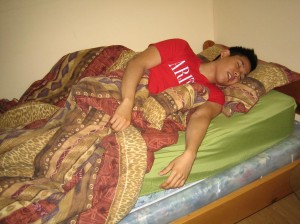Insomnia is a kind of sleep disorder characterized by difficulty in falling and staying asleep. People with this kind of condition wake up during the night and will have difficulty returning back to sleep again. These individuals wake up too early in the morning and are still tired once they wake up.
There are two types of insomnia – primary insomnia is when the person have difficulty sleeping but is not related to any problem or health conditions and secondary insomnia in which the person has problem sleeping due to health conditions like asthma, arthritis, depression, cancer, heartburn as well as medications taken and consumption of alcoholic beverages.
Insomnia differs in how the condition lasts and how often it happens. It can be short-term insomnia or acute insomnia and it can be chronic insomnia which means it can last for a long time, and it just comes and goes when the person has no problems in sleeping.
An acute insomnia can only last for one night or a few weeks, but with chronic insomnia, the person will suffer insomnia for three nights that may go on for weeks, months and even longer.
Causes
- The person has sickness, physical and emotional discomfort
- Stress in life like changing or losing a job, death of a family member or friend, and a divorce
- Some medications used for treating colds, allergies, high blood pressure, depression and asthma can cause difficulty in sleeping.
- Some factors like noise, light, or extreme temperature like hot or cold can cause difficulty in sleeping.
- A jet lag or switching from a day to a night shift.

Symptoms
- Tiredness of the body and irritability
- The person is sleepy during the day
- Loss of concentration or memory
Treatment
- The person should develop a good sleeping habit or psychotherapy.
- If insomnia is the side effect of the person’s medication, change the medication or reducing the dosage of the medicine can also help.
- A short-term insomnia that is caused by travel or stress tends to improves once the body has adjusted to the new schedule and it can be treated by over-the-counter sleep medications.
- If the person is suffering from diabetes or menopause, these conditions must be treated to minimize insomnia. If you want to learn how to manage these conditions, click here.
Some tips for beating insomnia
- Avoid taking snacks during the day since it makes the person less sleepy at night, and sleep at the same time every night and wake up the same time in the morning.
- Try avoiding caffeine, alcohol, and nicotine late in the day since they are stimulants and give the person difficulty sleeping in the night and can cause the person to be awake and will interfere with the quality of sleep.
- Exercise regularly not close to bedtime since it may stimulate the person and will make it hard to sleep. Perform exercises 3-4 hours before bedtime.
- Make the bedroom comfortable to sleep in. It should be dark and quiet and moderately warm or cold.
- Avoid eating heavy meals late in the day. Eat light snacks or drinking hot milk before bedtime since it can help a person sleep.
- If the person is lying and still awake worrying about things, he/she should do something like making a to-do list before sleeping.
